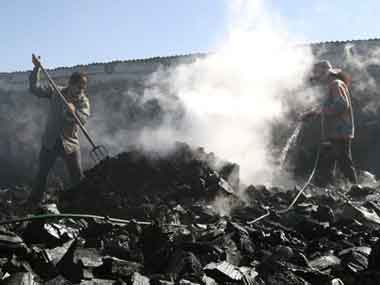By R Jagannathan
Even as one flawed energy policy - in oil - is being shown up for what it is (an economic fraud), another one is threatening to bob up to the surface, this time in coal. A third one has already popped up in gas, where the government and Reliance Industries are shadow-boxing on all fronts - from falling Krishna-Godavari gas production and gas and coal-bed methane pricing.
In coal, a private hedge fund, The Children’s Investment Fund (TCI), set the cat among the pigeons earlier this year by threatening to sue the Coal India board and its independent directors for kowtowing to the government on pricing and signing one-sided fuel supply agreements (FSCs) with power producers.
[caption id=“attachment_321057” align=“alignleft” width=“380” caption=“The big mistake is to treat coal as a subsidiary of power - which is the wrong way to make coal policy. It should be auctioned or sold separately since coal has uses beyond power.Reuters”]  [/caption]
The litigation scare was enough to put spine into the board, which has since been refusing to sign unfavourable FSCs, but this has now thrown up another issue: the monopoly power of Coal India being used to damage power producers.
How can these contradictions be ironed out?
Friday’s Economic Times has an interview with the chairman of the country’s biggest power producer, the National Thermal Power Corporation (NTPC), Arup Roy Choudhury, where he brings out the contradictions in the government’s policies starkly. In trying to humour an investor who may want Coal India to boost prices and profits, it may essentially be favouring a coal monopoly which has no incentive to keep prices reasonable. (Read the full interview here).
Said Choudhury: “Coal India has increased prices twice in the last one year because they are now a listed company and they want their share prices to remain high. Coal India may be the only company in the world where the production has gone down but the profits have gone up.”
Quite. Let’s see how the government actually runs the coal sector right now.
One, as Choudhury points out, Coal India is a monopoly. The government likes it this way because it can then use cheaply mined coal to subsidise politically sensitive prices like power tariffs. But having listed Coal India, it cannot afford to use the company’s pricing policy as a policy option.
Two, in order to encourage more investment in power, the government allots coal mines without auctions. What it does instead is get private power producers to bid for supplying power on the basis of tariffs, and throws in coal blocks almost for free. This is what prompted the Comptroller and Auditor General (CAG) to observe that the allocation of coal blocks between 2004 and 2009 resulted in “undue benefits” to private parties of Rs 1.8 lakh crore. Earlier, CAG had put the losses much higher.
The flaws in this twin-approach are obvious.
The big mistake is to treat coal as a subsidiary of power - which is the wrong way to make coal policy. It should be auctioned or sold separately since coal has uses beyond power.
A related mistake is that power producers have to compulsorily become miners as well. This is what NTPC’s Choudhury was protesting about. He told ET: “I am terribly unhappy that I have been made a miner from being a power generator. Mining is not my core competence. It is out of compulsion that I am getting into coal mining.”
He’s right. By forcing coal and power companies to be vertically integrated, the government is contributing to inefficiencies in two sectors - coal and power.
Partly with one eye on the CAG report, the coal ministry is preparing to auction coal blocks, and it is trying to level the field for private players by asking Coal India also to pay the reserve price for blocks coal in future.
But this is a half-way option. So what would be better?
According to Choudhury, the coal sector must be opened up to private miners, and the issue of monopoly pricing can be addressed by appointing a coal regulator.
This means amending the Coal Mines Nationalisation Act which restricts coal mining to the public sector and bringing in competition and regulation.
Hear, hear. Is the government willing to listen its own experts?
The big mistake is to treat coal as a subsidiary of power - which is the wrong way to make coal policy. It should be auctioned or sold separately since coal has uses beyond power.


)
)
)
)
)
)
)
)
)



